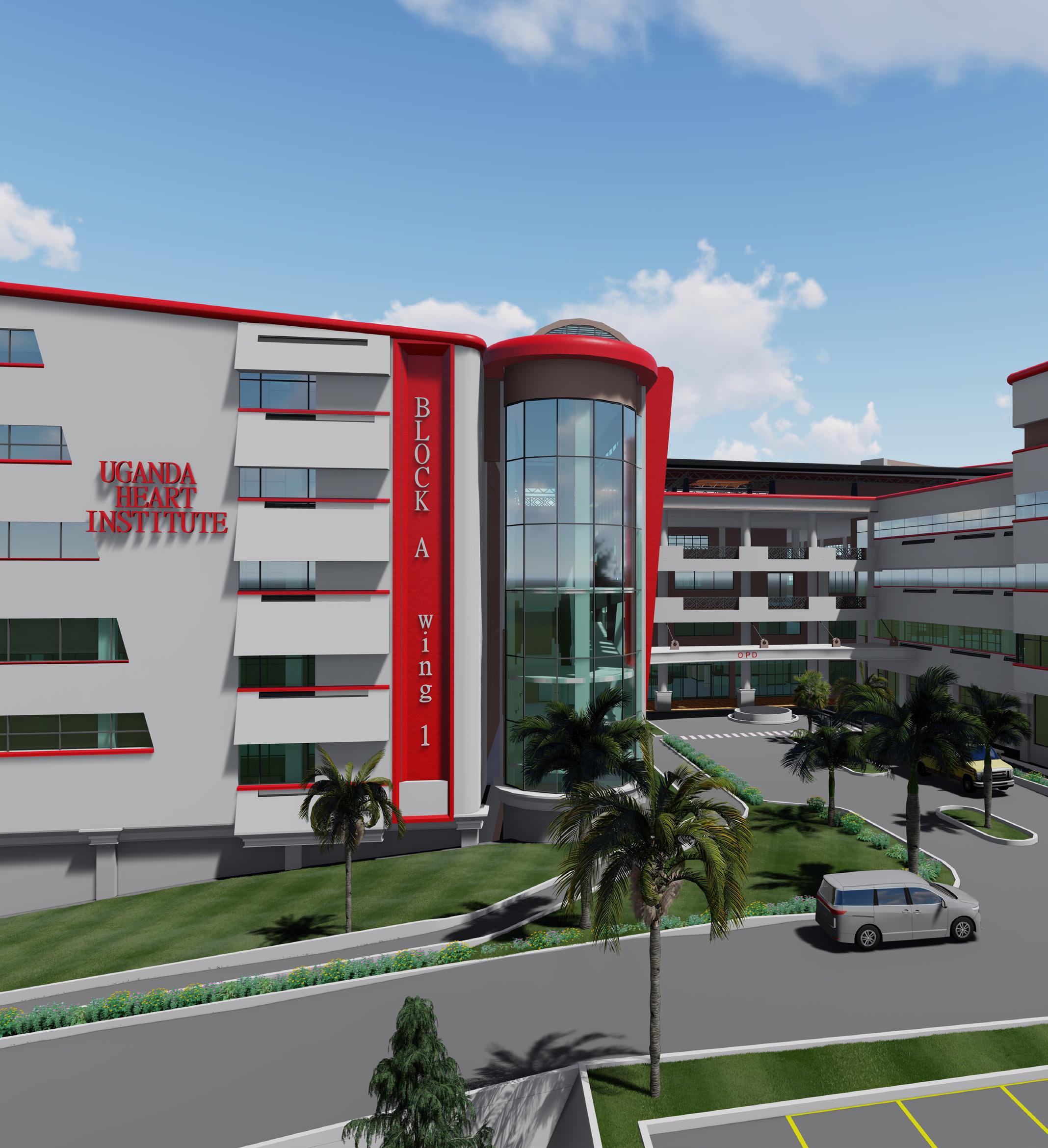
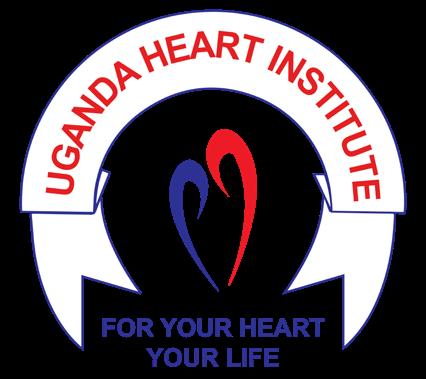
AT THE CENTRE OF CARDIOVASCULAR CARE

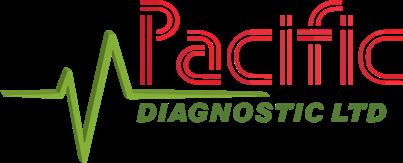
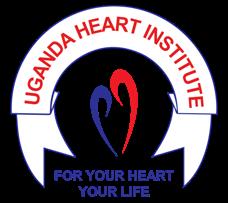







Dr John Omagino, Executive Director
PThe Uganda Heart Institute leads the fight against cardiovascular diseases through innovative research, comprehensive patient care, and a commitment to training the next generation of healthcare professionals. Executive Director, Dr John Omagino, emphasises the remarkable work being accomplished
Writer: Rachel Carr | Project Manager: Harry Thurlow
laying a vital role in the nation’s health, the Uganda Heart Institute (UHI) was established in 1988 and is currently a superspecialised leading provider of cardiovascular services and the only national referral facility for heart diseases in Uganda.
Operating as an autonomous body, mandated by the UHI Act of 2016 to manage and coordinate the country’s efforts in addressing cardiovascular diseases (CVDs), it is overseen by a Board of Directors responsible for carrying out the functions assigned by the act.
“Our vision is to be a global centre of excellence in the provision of cardiovascular care, and our mission is to provide preventive, promotive, and clinical services and
conduct research and training in the relevant science,” introduces Dr John Omagino, Executive Director.
UHI has attained the technical capacity to offer a complete range of cardiac services comparable to any centre of excellence in the world. This is for both children and adults, comprising diagnostic, non-invasive, and invasive procedures, intensive care and coronary care services, diagnostic and interventional cardiac catheterisation services, and open heart surgery.
Given the necessary operational adequate funding, UHI can comprehensively handle 95 percent of adult cases, including valve and coronary bypass surgery, plus 85 percent of paediatric cases. Additionally, it can ably teach and
train cardiac super-specialists in the cardiac super speciality and conduct high-calibre research to ensure quality care and generate the necessary data to guide policy, reducing the percentage of people being referred abroad to less than five percent.
“We serve a diverse and growing base of over 25,000 patients annually, drawn from all regions of Uganda and neighbouring countries,” Omagino explains.
UHI currently has a committed team of over 300 staff members, including cardiac critical care, adult and paediatric cardiology, cardiothoracic surgery, cardiac anaesthesia, cardiac nursing, allied and therapeutic professionals, and corporate staff, all working collaboratively to provide world-class cardiovascular care.
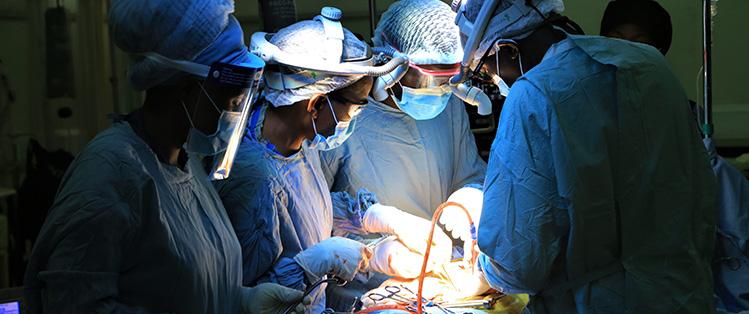

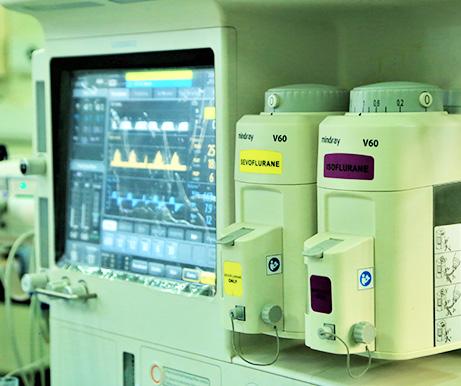
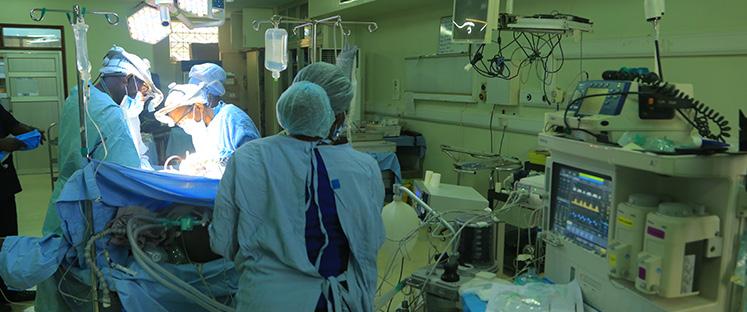
UHI is internationally recognised for its pioneering research on rheumatic heart disease (RHD), a major public health burden in sub-Saharan Africa. It leads several regional and global RHD studies and has contributed to key policy documents that guide prevention and management.
“Our work includes schoolbased screening programmes, echocardiographic surveillance, and clinical trials on penicillin prophylaxis and surgical outcomes. We also engage in advocacy and health education to raise awareness and reduce the stigma associated with RHD in schools and communities,” Omagino imparts.
Moreover, as a key partner in the Pan-African Society of Cardiology (PASCAR) and RHD Action networks, UHI contributes to the global goal of eradicating the disease by 2030.
Populations affected by RHD are at an increased risk of developing various cardiovascular issues, highlighting the need for early intervention. It’s equally important to note that Uganda is enhancing its capacity to address these challenges.
“This is an exciting time to work in the cardiovascular health space in Uganda. The burden of CVDs is rising rapidly, but so is our national capacity to respond.
“We are seeing stronger government commitment, greater public awareness, and more investment in health infrastructure. Most notably, the construction of our new 250-bed, super-specialised heart hospital in Naguru will be a gamechanger for cardiac care in Uganda,” he states emphatically.
UHI is also expanding regional heart centres, regional surgical camps, training programmes, and research collaborations that position Uganda as a leader in Africa.
Of course, challenges remain, particularly in terms of limited
Dr John Omagino, Executive Director: “My journey with UHI began with a deep conviction that Ugandans deserve access to world-class cardiovascular care, right here at home.
“After my master’s programme, I joined the African Research Universities Alliance (ARUA), where I was selected to join a dedicated team for specialised training at the International Heart School in Bergamo, Italy. We returned equipped with knowledge and also the essential equipment to establish what would become the UHI.
“We started modestly; our first surgeries were done with second-hand equipment in a small yellow house in Mulago. Despite resource constraints, political inertia, and competing interests, I remained committed to building a centre of excellence in cardiac care, research, and training.
“In 1996, we performed our first closed-heart surgery, and with each milestone, our belief in what was possible grew stronger. Over the years, I’ve worked closely with partners, government leaders, and our passionate clinical teams to expand UHI’s capabilities and reach.
“When private interests tried to divert our vision and bureaucratic obstacles threatened our funding, I fiercely advocated for UHI’s autonomy and mission. With the Ugandan President’s support, we secured our vote and independence in 2008, marking a major turning point.
“Today, I’m proud that UHI stands not only as a national referral centre but also a regional leader in cardiovascular care and research, saving thousands of lives, building capacity, and proving that determination, collaboration, and local leadership can deliver transformative health solutions.”

specialised personnel and access for underserved populations, but meaningful progress is being made.
“I find this sector incredibly fulfilling because it allows us to save lives, build capacity, and contribute to national development. For young professionals and innovators, this is a powerful space to be in. The potential to make an impact is real, and the future of cardiovascular care in Uganda is bright,” Omagino enthuses.
UHI plays a national coordinating role in Uganda’s national cardiovascular health response, working closely with the Ministry of Health and regional referral hospitals to strengthen the decentralisation of cardiovascular services through outreach programmes, local closed heart surgical camps, and capacity building.
CVDs are a major public health challenge in Uganda, contributing significantly to non-communicable disease mortality. To address this, UHI is establishing 16 regional heart centres to decentralise specialised cardiac care, reduce patient travel burdens, and improve early diagnosis and treatment.
“Phase One is already underway in Mbarara, Hoima, Gulu, Jinja, and Lira, selected and based on key factors such as land availability, proxim ity to medical institutions, and strategic national importance,” Omagino urges.
Whilst these centres take shape, UHI continues to conduct quarterly outreach visits across all 16 regions, offering screenings, minor procedures, patient treatment and post-surgery follow-up appointments, and training for local healthcare workers.
“THE POTENTIAL TO MAKE AN IMPACT IS REAL, AND THE FUTURE OF CARDIOVASCULAR CARE IN UGANDA IS BRIGHT”
– DR JOHN OMAGINO, EXECUTIVE DIRECTOR, UGANDA HEART INSTITUTE
Furthermore, a new state-of-theart cardiac facility currently under construction in Naguru will expand access to advanced cardiovascular care and reduce the need for referrals abroad.
“It will more than triple our cardiac surgical capacity from 300 to approximately 1,000 open heart surgeries annually, plus 8,000 to 9,000 interventional cardiology procedures in the two catheterisation labs (cath labs), allowing us to clear backlogs and treat more patients locally.
“This directly reduces the number of high-cost referrals abroad, saving the government and families millions of dollars per year. It will also enable us to increase our training and research capacity; we will build a self-sustaining ecosystem for cardiovascular excellence in Uganda,” Omagino promises.
UHI is steadily positioning itself as a destination for medical tourism in cardiovascular care by providing affordable, high-quality services that meet international standards. It has successfully treated patients from South Sudan, Rwanda, Burundi, the Democratic Republic of the Congo (DRC), and beyond the region.
“With our team of highly skilled specialists and state-of-theart interventions, patients are increasingly choosing UHI as a preferred alternative to expensive overseas referrals. Our vision is to become a regional referral hub for complex cardiovascular procedures,” Omagino reveals.
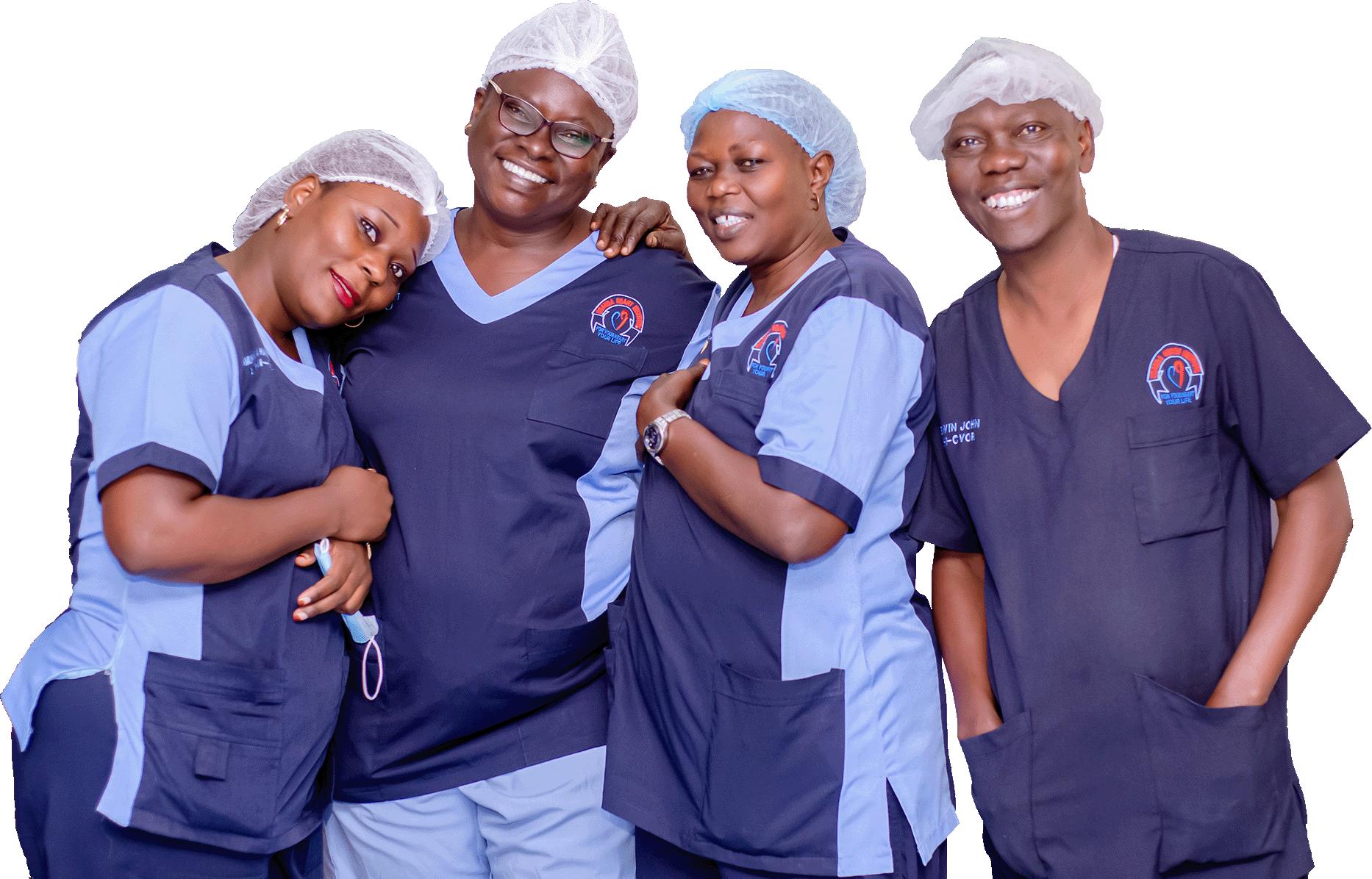


The, UHI began its in-house training programme in 2010 with three paediatric and adult cardiology fellows. Accredited by the Uganda Medical and Dental Practitioners Council, it has evolved into a comprehensive training hub, producing over 70 specialists across various cardiac disciplines.
In April 2021, UHI held its inaugural graduation ceremony, celebrating 49 fellows trained in multiple cardiac specialities. Its impact now extends beyond Uganda’s borders, having trained medical professionals from countries including the DRC, Liberia, and Somalia.
REGIONAL HEART SURGERY CAMPS – UHI is currently conducting regional closed heart surgery missions in Mbarara, Arua, Lira, and Gulu, bringing life-saving cardiac services closer to underserved populations. Building on this success, it plans to scale up these surgical camps to the remaining 12 of the 16 regional referral hospitals nationwide, further decentralising access to specialised heart care.
CAPACITY BUILDING PROGRAMME – UHI now delivers comparable, highquality fellowship training locally, significantly increasing accessibility and sustainability whilst strengthening Uganda’s national health system and regional capacity. It plans to build capacity through continuous professional development, academic exchange, and partnerships with universities and international training centres.
TELEMEDICINE PLATFORM – UHI and the Ministry of Health, along with its private partners, are piloting a telemedicine platform to support diagnosis and cardiac consultation at regional hospitals.
GREEN UHI INITIATIVE – As part of its environmental, social, and governance (ESG) initiatives, UHI has launched a sustainability campaign to promote heart health through increased environmental awareness and advocacy. The campaign focuses on tree planting, championing heart-friendly policies, and highlighting the environmental risk factors, such as pollution, that contributes to cardiovascular disease. It also seeks to strengthen partnerships with key stakeholders and raise public awareness around the critical link between a healthy environment and a healthy heart.

Founded in 2011 by Cveta Shirazi to address the glaring gap in post-sales technical support for high-value medical systems, Pacific emerged as Uganda’s first fully turnkey diagnostic medical equipment provider. With over a decade of presence and a national footprint, the company leads projects from concept to completion covering site planning, auxiliary power, installation, training, and long-term service.
“When I started Pacific, it was to show that local expertise could not only match but exceed international expectations,” says Cveta Shirazi, Founder and Executive Director. “We saw clearly that we could not rely on external service support, and our aim was to increase local capacity. This became critical during COVID-19 when borders closed. We invested heavily in training Ugandan engineers and empowering our medical community with the skills needed to operate and maintain advanced systems. We didn’t just import machines; we built trust, one project at a time.”
To date, Pacific has completed over 25 CT installations across Uganda and is the trusted MRI supplier for 7 out of 10 private hospitals.
Key achievements include:
• The landmark installation of Africa’s first ACUSON Origin advanced cardiac ultrasound system with AI at Uganda Heart Institute: introducing the highest-tier cardiac technology into clinical practice.

In a healthcare landscape long dominated by external suppliers and foreign-led narratives, Pacific Diagnostic Uganda has carved an extraordinary path.
Led by the cross-generational mother-daughter duo of Cveta and Leila Shirazi, the company has redefined access to advanced medical technology in Uganda and today stands as a symbol of what local leadership, vision, and generational continuity can achieve.
Pacific’s story goes far beyond logistics. With a proven record across Uganda’s top healthcare institutions and a deeply rooted service culture, Pacific has become the silent force behind some of the country’s most advanced diagnostic and surgical capacities. The company’s commitment to local service support through factory-trained engineers ensures preventative maintenance, reduces downtime, and strengthens responsiveness building resilience where it matters most.
St. Francis Hospital Nsambya remains one of Pacific’s longest-standing partnerships defined by trust, innovation, and sustained clinical impact.
“Our collaboration with Pacific Diagnostics has exemplified the power of grounded innovation. Together, we introduced Uganda’s first 128-slice CT, added MRI and high-resolution echo systems, and in 2025, upgraded to the latest 128-slice Go.Top CT still after 13 years of uninterrupted use.
• Over 30% market share in ultrasound across all brands in 2024.
• Uganda’s first 70cm bore 1.5T MRI at C-Care IHK and the first heliumfree MRI, now being installed at Kisubi Hospital.
• Delivery of advanced neurosurgical and surgical technology at Ruby Hospital.
• Recipient of two 2024 Siemens Healthineers ultrasound awards: Outstanding Performance and Standalone Sales Excellence.

This partnership has shaped a radiology department that continues to set the standard for excellence in Uganda,” says Dr. Andrew Ssekitooleko, CEO, St. Francis Hospital Nsambya.
“We are deeply passionate about transforming the healthcare sector in Uganda. This is just the beginning. Our vision is to expand access to world-class diagnostic care for every corner of the country,” says Leila Shirazi, Director of Sales and Marketing.
Despite all obstacles, Pacific continues to rise, delivering excellence with integrity, building systems that last, and proving that homegrown leadership in medtech is not just viable, it’s unstoppable. In a world of competing interests, Pacific’s unwavering focus remains on one thing: putting the development of Uganda’s healthcare infrastructure to international standards first.
For Uganda, Pacific represents more than a supplier it is a living system of excellence, proof that transformation can be led from within and made to last.


1. Operationalising the new UHI cardiac facility in Naguru, with phased opening and service roll-out beginning in 2027.
2. Scaling up regional services through outreach, establishing regional heart centres, telemedicine, and strengthening referral systems.
3. Expanding research capacity, particularly in CVDs.
4. Enhancing community-level prevention by integrating heart health education into schools, churches, workplaces, and communities.
5. Achieving international accreditation for quality standards and positioning UHI as a certified centre of excellence in Africa. Ultimately, the goal is to ensure that no Ugandan should have to leave the country for life-saving heart care.
“We currently offer seven accredited fellowship programmes which include adult cardiology, paediatric cardiology, cardiac surgery, cardiac anaesthesia, cardiac critical care, cardiac nursing, and
catheterisation technology. The programmes emphasise clinical excellence, research, mentorship, and leadership in cardiovascular health.
“Previously, specialised training required international travel at a cost
of over USD$100,000 per trainee. We deliver comparable, high-quality training locally at just a quarter of that amount, significantly increasing accessibility and sustainability, whilst strengthening Uganda’s national health system and regional capacity,” Omagino closes earnestly.
This approach not only benefits patients locally but also presents an opportunity as the UHI model of establishing a high-quality tertiary centre within a resource-constrained setting, and with government support, can be exported to developing nations.
The construction and equipping of UHI’s state-of-the-art hospital in

“OUR VISION IS TO BE A GLOBAL CENTRE OF EXCELLENCE IN THE PROVISION OF CARDIOVASCULAR CARE, AND OUR MISSION IS TO PROVIDE PREVENTIVE, PROMOTIVE, AND CLINICAL SERVICES AND CONDUCT RESEARCH AND TRAINING IN THE RELEVANT SCIENCE”
– DR JOHN OMAGINO, EXECUTIVE DIRECTOR, UGANDA HEART INSTITUTE
Naguru is a flagship national project aiming to transform cardiovascular care in Uganda.
The increasing prevalence of CVDs highlights the urgent need for a dedicated, modern cardiac facility. Considering this, the government has secured USD$70 million in financing for the hospital from the Arab Bank for Economic Development
in Africa (BADEA), OPEC Fund for International Development, and Saudi Fund for Development (SFD) to support the construction of a 250bed hospital.
The cardiac facility is being built on 10 acres and the first phase will comprise a modern complex of three main blocks – clinical, administration, and accommodation. It will house
three cardiac operating theatres, two cath labs, and a 40-bed cardiac intensive care unit (ICU), all designed to support high-volume, high-quality specialised care.
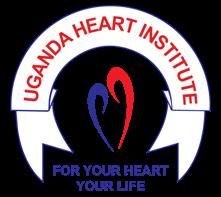
Tel: (+256) 417 720 350
info@uhi.go.ug
www.uhi.go.ug

Tel: (+256) 417
350 info@uhi.go.ug www.uhi.go.ug
